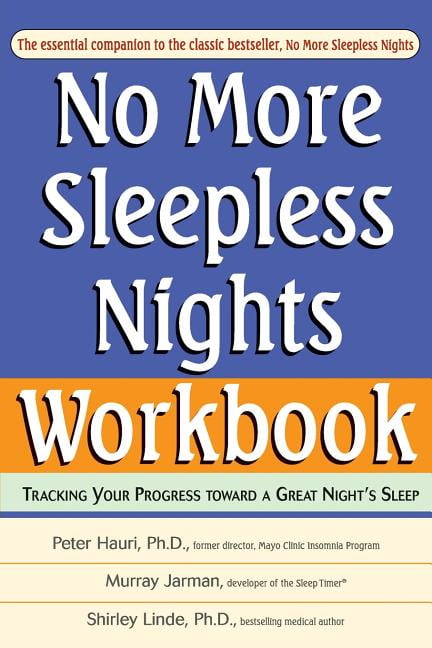
You can turn to books such as, “No More Sleepless Nights” and the “No More Sleepless Nights Workbook,” by Peter Hauri and Shirley Linde. Where do you find the knowledge, routines, and persistence that you need to help you get a good night’s sleep, change your stress response, and improve your quality of life? The secret to managing stress is in how you interpret it, what you focus on, and whether you have the understanding and skill to go through it in a healthy way.

Short bursts of stress can even be physically and emotionally healing.

#No more sleepless nights workbook how to
Stress, if you know how to manage it, can motivate, energize, and build resilience. This is not something that just “happens” to lucky people, but rather something you create.īut for most people it’s not your lifestyle choice or the amount of stress you face that determines how good you feel or how well you sleep. It’s helpful to have balance between challenge and relaxation, focus and rest. Lifestyle is part of the answer, and many people need to make lifestyle changes. The Mayo Clinic, which outlines the risks and side effects of sleeping pills, recommends lifestyle change as the best solution for insomnia. In a way, sleeping pills distract you from what you really need. They don’t encourage the kinds of inner and outer change that can help with sleep. They don’t motivate you to respond differently stress. Sleeping pills don’t reduce your anxiety, alleviate your depression, or process an emotionally difficult event. People who have the tools and abilities to manage their response to stress feel better, perform better, and sleep better. The real problem is about how you respond to stress. However, pills don’t address the real problem. In a difficult moment, for some people, sleeping pills can help. Other causes of insomnia include anxiety, illness, and hormone imbalance. For James, the insomnia started after the death of his father. It can gradually build up over time, or come on strong after an emotional event. Insomnia can be a mild annoyance or make it impossible to function. In several FDA studies, subjects who took sleeping pills fell asleep an about 15 minutes faster than a control group, and slept about 30 minutes longer. Sleeping pills can help insomnia temporarily, but the costs are high, and you don’t get much more sleep for your efforts. It’s nice to have the option if you need it, but you want to consider alternatives like public transportation or riding your bike, and turn in the car as soon as you can. When your car doesn’t work, you might use a rental car…but the fees add up quickly. He was glad to have the support, and also glad when he could take it off. He needed a cast and a pin to support the bone while it healed. My son recently took a fall from about ten feet in the air (don’t even ask how he got there…), and broke his wrist. When you run into unexpected obstacles in life, it’s often helpful to find something to help you cope.

So if you have insomnia, and you want an alternative to pills, how do you get a good night’s sleep? Third, many people who try to stop using them have a “rebound effect.” This happens when you cut down or stop (which should always be done with the advice of your physician), and your insomnia comes back worse than ever.

This means that you have to use more to get the same effect. Second, sleeping pills can stop working as your body develops a tolerance for the medication.


 0 kommentar(er)
0 kommentar(er)
